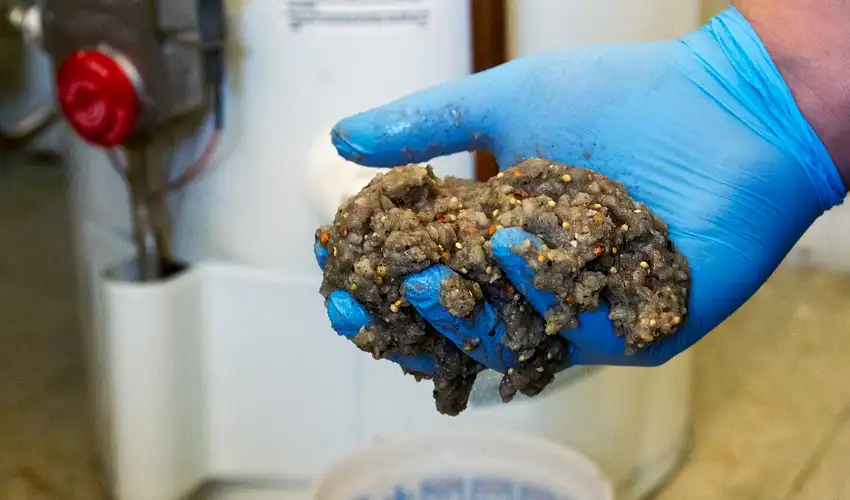Water Heater Rumbling? Here's What You Should Do About It

Is your rumbling water heater keeping you awake at night? Maybe you hoped the issue would resolve on its own, only to realize that the sound is here to stay. Whatever the case, you need to do something to fix this.
A rumbling water heater is more than just an annoyance; it could be a sign of bigger issues. When it comes to water heaters, it's always better to err on the side of caution. That's why we've outlined common reasons for noisy water heaters, how to drain and flush one, and answered a few frequently asked questions about rumbling water heaters:
- Why Is Your Water Heater Making a Rumbling Noise?
- How to Drain and Flush a Water Heater
- Water Heater Rumbling FAQs
Why Is Your Water Heater Making a Rumbling Noise?
A rumbling water heater is concerning and could mean many different things. Here are some of the most common causes of a noisy water heater:
- Sediment buildup in the bottom of the tank due to hard water. The rumbling sound is caused by boiling water trapped inside the sediment layer.
- Heavy sediment and rust buildup from extended use. This issue can lead to overheating problems, which shorten the lifespan of your water heater and risk severe water damage.
- Too much cold water entering the tank at once. Though this issue is not a cause for concern, the sound can be disconcerting.
Thankfully, all of these issues can be resolved. Fixing these issues, rather than purchasing a new water heater, can save you money and extend the lifespan of your existing water heater by several years.
How to Drain and Flush a Water Heater
Whether the rumbling is due to sediment buildup or boiling water from hard water scale, you will need to drain the water heater tank and then flush out the existing sediment. Take the following ten steps to drain and flush the water heater and stop the rumbling:
- Turn off the power to the water heater. For gas water heaters, turn the heater's gas control to the "Pilot" setting. For electric water heaters, turn the water heater off at the home's circuit breaker.
- Turn the lever to the cold-water supply clockwise 90 degrees.
- Connect a garden hose to the drain valve and place the hose's other end at the basement drain, utility sink, or outside the house.
- Turn on a hot water faucet somewhere in the house. This introduces air into the system, preventing a vacuum from forming in the water tank.
- Open the drain valve to empty the water heater tank.
- Once the tank is empty of all water and debris, open and shut the cold-water supply valve repeatedly to flush out any remaining sediment. Stop once the water is running clear and you know the sediment is gone.
- Close the drain valve and disconnect the garden hose.
- Turn the lever to open the cold-water valve on the water heater.
- Turn off the hot water faucet you turned on earlier. Once the stream of water flows steadily, the air is out of the system.
- Restore the gas or electrical power to the water tank to allow the water to heat up again.
Sometimes, the sediment at the bottom of your tank solidifies. If this happens, you need to enlist the help of a professional plumber.
Water Heater Rumbling FAQs
How do you know if your water heater is about to burst?
The worst possible outcome of any water heater issue is an explosion. This has the potential to cause more than just water damage. It can crack walls and floors and pose a severe injury risk to anyone in the home. Here are a few signs that your water heater might be on the verge of bursting:
- Popping noises: When a water heater fills with sediment, it makes a popping noise. This loud noise is caused by water heating beneath the sediment layer. Though it’s not always indicative of an imminent explosion, it is an issue that needs to be addressed quickly.
- The smell of sulfur: The smell of rotten eggs or sulfur indicates a gas leak near your water heater. If the gas reaches a high enough concentration, it can cause an explosion.
- Brown water: Brown water indicates the presence of sediment in your tank. Specifically, it means that rust is present. This water is dangerous to drink and indicates that the tank is weakening.
- Temperature and pressure valve problems: If the temperature and pressure valve is always open or is leaking, there is an increased risk of explosion. This valve controls both temperature and pressure, so any issues with it can lead to excessive pressure in the tank.
If you notice any of the above issues, shut off the water supply to the heater and contact a plumber immediately.
Get the Professional Assistance You Need for a Rumbling Water Heater
Whether you want help draining sediment from your water heater or need to replace your current model, Mr. Rooter® Plumbing is here to help.
Our friendly, experienced technicians are available to provide long-lasting plumbing solutions to extend the life of your water heater and ensure it runs optimally. Contact your local Mr. Rooter Plumbing location by phone or request an estimate online today.
 Click to call
Click to call


